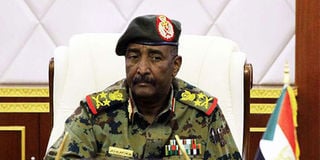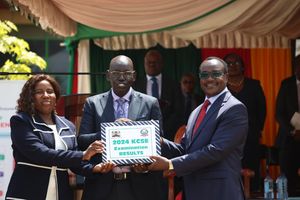Sudan coup: Under-fire military junta promises to continue transition

Sudan's army ruler General Abdel Fattah al-Burhan in Khartoum on April 16, 2019.
Sudan’s military junta on Tuesday promised to continue with the transition to civilian rule “once the crisis is over”, a signal that he is seeking rapprochement with the international community.
Lt-Gen Abdel Fattah al-Burhan told the media in Khartoum that there will be a new government of experts and technocrats as soon as possible, a day after he controversially dissolved the transitional government led by Prime Minister Abdalla Hamdok.
“We intend to safeguard all the gains including the peace agreements and the freedoms of the people,” Burhan said in Khartoum, where protests have raged since Monday when the military forcibly took power in a coup.
Burhan, who also imposed a state of emergency and cut internet and telecom connections, said the services had been “abused by people who wanted to cause trouble” and argued they will be returned as soon as the protests stop.
“The state of emergency will be lifted once we establish a government of experts and technocrats. We will make reforms and protect those reforms without any conditions. This is not a coup, we acted to protect the transition.”
Despite his argument that the takeover was not a coup, international partners disagree. The Intergovernmental Authority on Development (Igad), of which Sudan is the current chair, the African Union, the United Nations and Western allies like the US all demanded resumption of the transitional government. The US even suspended aid worth $700 million until order resumes.
Burhan’s soldiers conducted morning raids on Monday, arresting several cabinet ministers and the prime minister himself and his wife.
The cabinet ministers in charge of industry (Ibrahim al-Sheikh), information (Hamza Baloul), and cabinet affairs and communications (Faisal Mohammed Saleh), as well as the spokesman for the transitional sovereign council (Mohammed Suliman), were picked up alongside PM Hamdok and his wife, and shipped to unknown location in Khartoum.
However, on Tuesday, Burhan suggested the PM and his wife had been isolated from the group, saying “the prime minister is my guest and will be allowed to leave once the crisis is over. He is in good health”.
There were no guarantees on when the new government will be formed or who will comprise it. Already, civilian groups who supported Hamdok have rejected the coup. And armed groups who had been negotiating for a peace deal also rejected it.
Abdul Wahid Mohammed Ahmed al-Nour, leader of the Sudan Liberation Movement, one of the groups that had yet to join the government, said the Sudanese must reject the coup and refuse a “blood partnership” with the military.
Burhan did say the new transitional government will play no politics, saying selfish individuals had stalled progress.
The junta, however, suspended flights into and out of the country as protesters continued to demand the release of the officials and the restoration of the transitional government.
The coup came just a month after Burhan claimed forces loyal to ousted leader Omar al-Bashir had attempted to topple the government.
With both Bashir and the military’s supporters keen to keep power, some analysts argue they now have a common agenda of staying influential. And it could benefit Bashir, now in jail for corruption.





